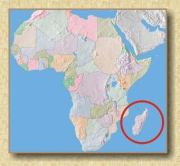The biggest challenge for me thus far in Madagascar is adjusting to Sakalava, the dialect of Malagasy spoken in my village. One reason for the challenge is that the Malagasy love laughing in my face when I speak it. This is understandably discouraging. Another reason is that since Sakalava is only spoken in a corner of a country already resting in the corner of the world, there aren’t Sakalava documents or reading materials to study. Thirdly, Sakalava is very different from any language I’ve ever learned.
As I’ve mentioned before, the standard syntax for Sakalava is verb, object, subject. The sentence “I’m buying sugar” in English switches to “Buying sugar I’m” in Sakalava. But Sakalava speakers don’t care for rules. If you want to say “I’m buying sugar,” you can. You can also say “Buying sugar I’m” or, more commonly, “Buying sugar.” Most Sakalava speakers outright ignore the subject, so if you’re not paying careful attention to a conversation, you have no idea who is doing what. That’s why everyone in this region is always asking the question “Who?” For instance, I’ll be talking with the little neighborhood girl, and I’ll ask, “Like drinking tea?” and even though we’re the only two people sitting on my patio, she’ll reply, “Who?” “You. “Me? Yes, like drinking tea.”
In Sakalava, the verb “to be” doesn’t exist. “He is cold” in English becomes “He cold” or “Cold he.” The conversation, “Cold.” “Who?” “He,” would also be acceptable.” If I simply said, “Tired,” everyone would understand that I was tired because I was the one saying it. As you can tell, many Sakalava conversations depend on context and association.
Every verb in the active tense begins with the letter “m.” This rule, plus the fact that most verbs seem to at least eight letters long, makes memorizing verbs a giant pain. Try memorizing “mampiavaka,” “mampiemotro,” and “mampihindrana,” for the verbs “to distinguish between,” “to delay,” and “to lend,” and you’ll see what I mean. Actually, a majority of the language begins with the letter “m.” The Peace Corps gave us a Malagasy/English dictionary during training, and words beginning with “m” filled 60 of the dictionary’s 100 pages. Yeesh.
Learning English is a beast because it has many verb tenses. What’s nice about Malagasy is that there are only three verb tenses: past, present, and future. And it’s so easy to do, I can teach it to you in two sentences. When the verb begins with an “m,” it’s in the present tense. To put it in the past tense, replace the “m” with an “n,” and for the future tense replace the “m” with an “h.” That’s it! For example, the verb “to buy,” “mivanga,” becomes “nivanga” in the past tense and “hivanga” in the future tense.
Lastly, an interesting thing about Sakalava is that it’s heavily been influenced by French. In Official Malagasy, “thank you” is “misaotra,” but in Sakalava it’s “mersy.” Other French words have undergone Malagasy changes. For a phrase, “la phrase” in French is “frazy” in Sakalava; for a shower, “la douche” in French is “ladosy” in Sakalava; and for a potato, “la pomme de terre” is “pomdetera.” I’d wager that five or ten percent of the dialect comes from French. In Madagascar, the national currency is the Ariary, but Sakalava speakers prefer putting their prices in Malagasy Francs.
I’m having a little difficult time with Sakalava because it’s difficult to understand. Everyone speaks so quickly and slurs their words together. Many people in my village also speak a combination of dialects because they were raised elsewhere, so I often encounter words not commonly used in my village. I’m not frustrated, though. I’m remembering to stay patient. I’ve only been speaking this dialect for two months. Plus, I’m developing a pride in my dialect. It’s a linguistic badge of a village I’m happy to call home.




Hmmmm. This could be interesting.
In your previous posting, you mentioned that Mrs. Robinson attempted (to no avail) to proposition you by saying “Love”
If I were to empoly your English lesson from above, one could ask any of the following:
(1) Are you asking me to make love to you?
(2) Do you want to make love to me?
(3) Are you a product of love?
(4) Do I make love to myself
Interesting possibilities. Especially IF YOU’RE A SICKO LIKE ME!!!
How about describing to us your experience with Passive Voice.
Jordan, have you met a PCV named Christie-Anne?
Christie-Anne is Maggie’s backfill.
Yes, sir, I know Christie-Anne quite well! We’ve spent many days together now, and will continue to do so until the political crisis concludes 🙂